SUMMARY
This is AI generated summarization, which may have errors. For context, always refer to the full article.
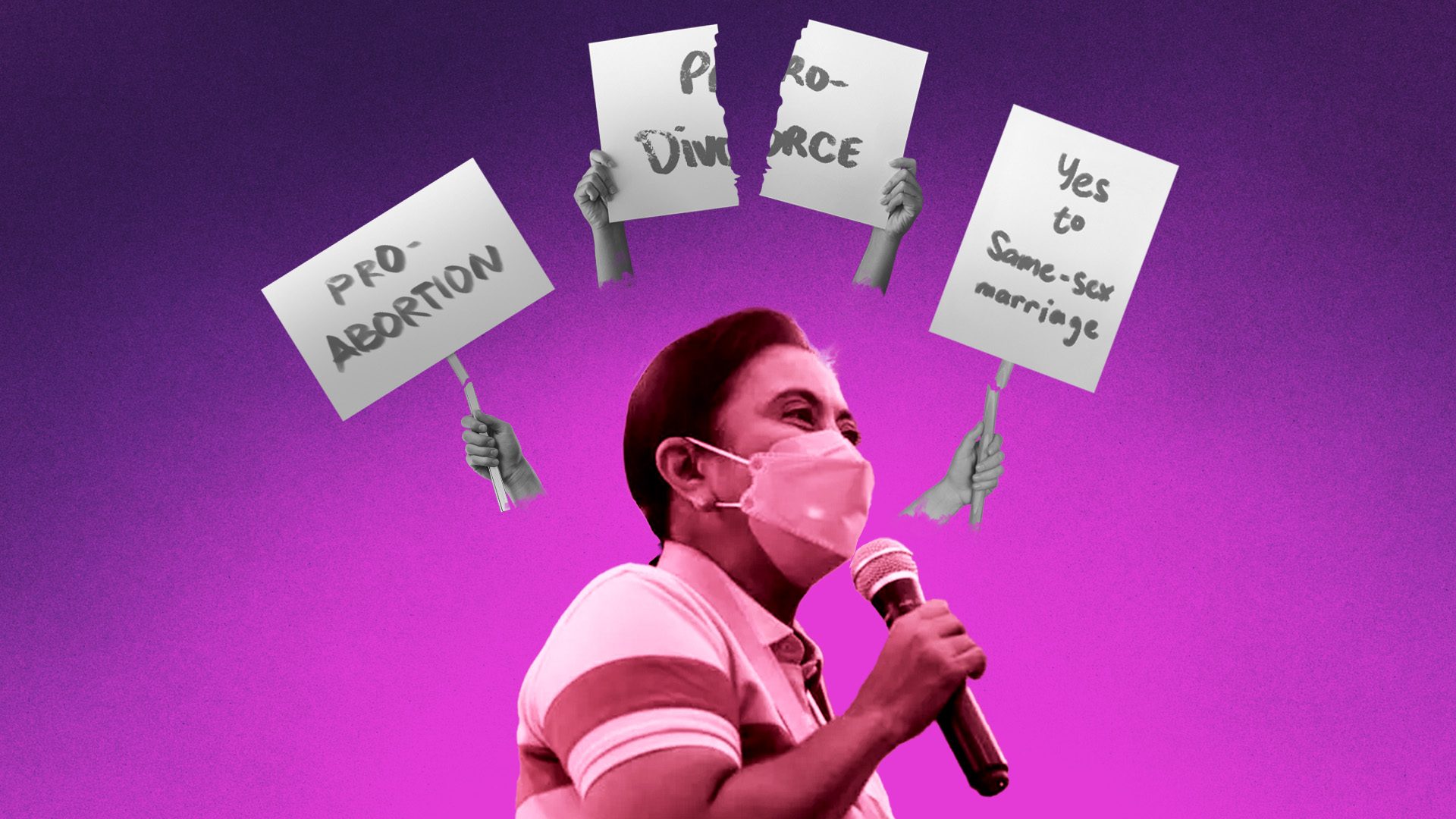
MANILA, Philippines – Lone female presidential candidate Vice President Leni Robredo has disappointed some of the women she claims to empower.
As media interviews, debates, and forums went into full swing with the election season, the presidential candidates were asked what they thought about divorce, abortion, and same-sex marriage – three issues the country is deeply divided about.
Robredo has given answers expected from the devout Catholic that she is: anti-divorce, anti-abortion, and anti-same-sex marriage. But Robredo has continued to champion her gender in her campaign, expressing her conviction to still step up to the presidency despite sexist attacks from President Rodrigo Duterte over their six-year terms.
“The best man for the job is a woman,” Robredo said in her closing statement in the Commission on Elections’ first presidential debate on Saturday, March 19. It is an apparent reference to a statement she made in an ABS-CBN debate in 2016: “The last man standing is a woman.”
The Vice President has been called a women’s rights champion. Long before she entered politics, Robredo co-founded in 1989 the Lakas ng Kababaihan ng Naga Federation, an organization that provides training and livelihood opportunities for women. She also represented abused women in court as an alternative lawyer with Sentro ng Alternatibong Lingap Panligal (SALIGAN) for almost a decade.
Women empowerment became one of the six advocacy areas of Robredo’s signature Angat Buhay program in the Office of the Vice President, where she uses a gender lens to combat poverty.
Despite these, Robredo’s hold over a solid feminist vote may have been compromised. Her stances on the said gender issues go against what many advocates have been fighting for in a country that is still under a strong patriarchal grip.
But in contrast to some of her fellow presidential candidates like Senator Manny Pacquiao and Manila Mayor Isko Moreno, who are hardline against same-sex marriage and abortion respectively, Robredo offered apparent compromises.
Instead of divorce, Robredo thinks existing remedies in the country to get out of a marriage, like declaration of nullity, should be made more accessible to the poor. While she was personally against abortion, she was “open to discuss” decriminalizing it. Same-sex marriage was off the table for her, but same-sex unions were not.
These were not the exact answers progressive feminist groups were hoping to hear, but some are willing to bank on the fact that the Vice President might change her mind.
Anxiety over a ‘criminal’ decision
“I have always been against abortion,” Robredo said in a September 2021 Rappler Talk interview. “Pero iyong sa akin, para hindi tayo humantong sa extreme situations, kailangan natin na i-strengthen iyong local health – hindi lang facilities, eh, pero iyong local health services (But I think, so that we can avoid extreme situations, we need to strengthen local health facilities and services),” she said.
The Philippines has a strict law against abortion, but this has not stopped women in the country from trying to induce them. At least three women die every day from complications from unsafe abortion, according to the Philippine Safe Abortion Advocacy Network.
Grace, not her real name, underwent a secret abortion in the Philippines at the onset of 2022. She has shared her story with a very select few, because “you don’t really know who to trust.”
The 23-year-old freelance writer knew the day she found out that she was pregnant that she was not mentally or financially ready to have a child. But just with some Google searches, she was able to access reliable information about medical abortion, or abortion induced by pills.
Grace found out how women induced abortions in countries where the process was legal. She learned the names of the medicines she needed to take, and the next step was acquiring them. Even if abortion was illegal, keying in the words “abortion pills Philippines” allowed her to find a number of sources that were willing to help in her situation.
“What it cost me was around P7,000 to buy those pills. And of course, there was anxiety in how you don’t know who you’re dealing with. You’re shelling out P7,000 for something that you’re not sure would work,” Grace said.
But when the pills arrived at her doorstep via a courier service, Grace said she felt relieved. “It was a really big problem I was carrying inside my tummy, and now, hawak ko na ‘yung solusyon (I had the solution in my hands).”
Grace induced her abortion around six weeks into in her pregnancy – considered a safe time period for medical abortion. She did not seek a medical professional’s guidance, afraid that she would drag someone else into a possible criminal case.
Still, Grace said she feels privileged to have had access to information and money that allowed her to do the process safely. Many other Filipino women, a number of whom are poor and victims of rape, resort to dangerous, backstreet methods that may cause trauma and death.
“I’m done with the process, but it’s still infuriating to know that people, women just like me, are treated like criminals just for going through that. I don’t think this is an issue really of saving a life kung (if) pro-life, or pro-abortion, really, what we want is to give people, women, a choice,” Grace said.
In an interview with television host Boy Abunda on January 26, Robredo said that she was “very conflicted” about abortion, but was “open to discuss” its decriminalization.
To this, Grace said, “Kailan ba siya makikinig if not now? Kailangan ba munang iboto ko siya para makinig siya doon sa issues, doon sa demands ng iba’t ibang sektor?”
(When will she listen if not now? Must I vote for her first so that she listens to the issues and demands of the different sectors?)
‘Disappointed but not surprised’
Shiph Belonguel, a sexual and reproductive health and rights advocacy officer at an international nongovernmental organization (NGO), said she was “disappointed but not surprised” that Robredo was taking conservative stances. She believes Robredo is trying to court the Catholic church’s vote, aside from being a devout Catholic herself.
“The only real solution to preventing death and disability as a result of unsafe abortions is to make sure safe and legal abortions are available,” said Belonguel.
“Women will keep needing abortions because contraception is not always effective, because not all pregnancies end up viable anyway even when they are wanted, pregnancies can be a result of rape and sexual violence, among a myriad other reasons women get abortions for,” she added.
Robredo said in her interview with Abunda that, in her work as an alternative lawyer, she came across “so many” rape survivors – many of whom were minors – who had to endure unsafe pregnancies. Here, her faith clashes with her understanding of “the day-to-day” realities on the ground, where abortions may be crucial to the survival of the mothers.
Realities of loveless marriages
The Philippines remains to be the only country in the world apart from the Vatican without divorce. Robredo has said that instead of legalizing divorce right away, the government should give poor Filipinos greater access to the declaration of nullity.
Lawyer Clara Rita Padilla, executive director of EnGendeRights, is a staunch advocate for divorce and has worked with SALIGAN – the same NGO Robredo worked for as an alternative lawyer.
Padilla said that Article 36 on the Family Code on nullity of marriage has “failed” Filipino women who want freedom from their abusive marriages. The lack of access to divorce, she said, continues to perpetuate discrimination against abused women.
“Countless women remain ‘married’ because courts denied their petition for nullity despite clear evidence of physical, psychological, sexual, and financial abuses of the husband,” she said.
Padilla has served as a resource person in congressional hearings tackling the divorce bill, and has stressed that achieving declaration of nullity is “too difficult, too traumatic, and too costly.”
“To the horror of legislators, I cited the denial of the petition for nullity even when the drunkard husband would arrive home and pee on his wife and children. Nullity cases are extremely traumatic for women who are forced to continuously relive the abuses they and their children suffered from their husbands starting from petition drafting, during their court testimony, and the long protracted court case,” she said.
The lawyer said that women in abusive marriages need divorce because the measure has clear grounds which are easier to prove, and may be less traumatic and costly.
Despite her differing stance, Padilla still supports Robredo’s candidacy, and holds onto one thing in her hope of Robredo changing her mind: trust. In the interview with Abunda, Robredo said that dialogues with stakeholders firm about the need for divorce have made her “open” to it.
Robredo also keeps as a close ally under her slate reelectionist Senator Risa Hontiveros, who has consistently pushed for the passage of the divorce bill.
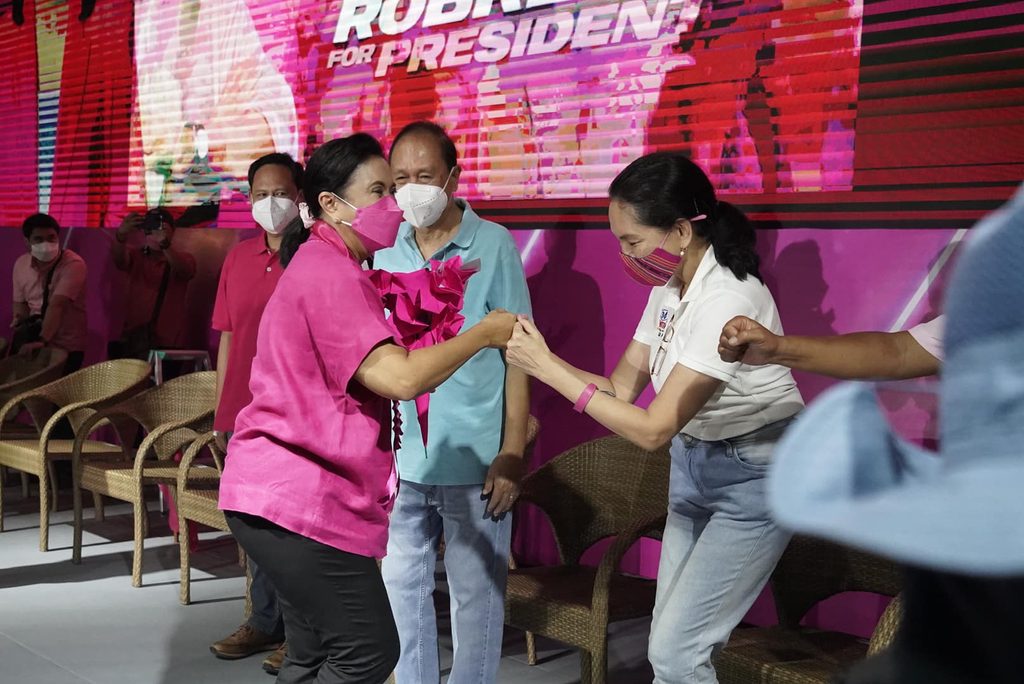
“Leni worked in the same NGO that I worked with where we assisted women, urban poor, workers, and farmers, and it is the same selfless passion to help others that I trust Leni to heed our call to immediately pass laws on divorce, SOGIE (sexual orientation, gender, identity, and expression) equality, marriage equality, gender recognition, among others,” said Padilla.
Padilla said she believes in Robredo’s track record of competence, human rights work, good governance, and swift responses in the pandemic and disasters.
“I trust Leni will lead our country to greater heights in good governance and that she will uphold democracy and freedom of speech, fight against corruption, and hold perpetrators of human rights accountable,” she said.
On ‘genuine’ marriage equality
Not a single bill pushing to legalize same-sex marriage has been filed with the 18th Congress. Robredo, meanwhile, has said that she is “all for” same-sex unions, but not same-sex marriages.
“I support same-sex unions. I have always been very open about freedom of choice – ‘yung pagbigay ng kalayaan para sa lahat na i-pursue ‘yung gusto nila basta hindi ito makakasama sa kapwa niya (giving all the freedom to pursue what they want as long as they do not hurt anyone),” Robredo said on Rappler Talk.
But Bahaghari, a national democratic LGBTQ+ rights organization, advocates for same-sex marriage.
“We think that the goal is really to have genuine equality, and we cannot really have genuine equality if there is a different category for heterosexual people, and then for other people like us, it’s called civil unions,” Bahaghari chairperson Rey Valmores-Salinas told Rappler over Zoom.
Despite this, after weighing a number of factors, it is because of Robredo’s “relatively more progressive” position on same-sex unions and her platform’s “shared vision” with Bahaghari’s intersectional advocacies that the organization still chooses to endorse her for the 2022 polls. Robredo is also for the passage of the SOGIE anti-discrimination bill.
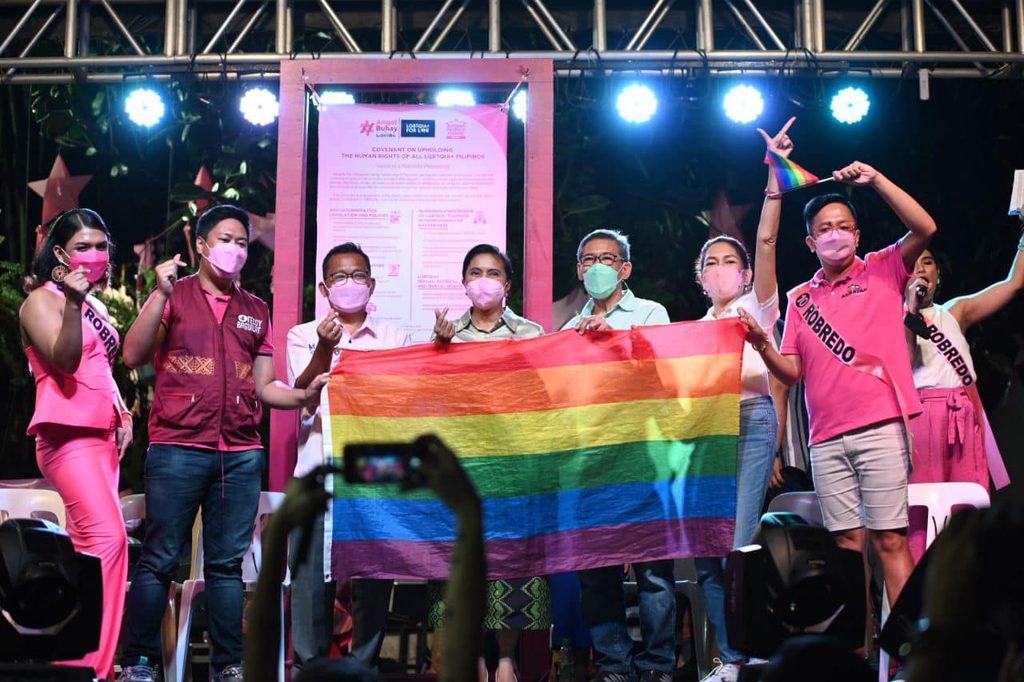
In Bahaghari’s work engaging with urban poor communities, Salinas said that many Filipinos want what would be provided by a civil union, such as recognition by the state, shared property and inheritance, tax benefits, and the ability to consent in medical situations. (READ: What would a civil union be like in the Philippines?)
“But that does not mean that we will stop there, because, of course, it is a big thing to finally recognize people regardless of their gender in the eyes of the law. We feel that this should be complete and holistic, and therefore, our own Family Code should reflect that marriage is something that is between people, regardless of their gender,” said Salinas.
Salinas said that Bahaghari still supports Robredo, despite her imperfect stance on marriage equality, because of her platform geared towards a “scientific and people-centered pandemic response,” as well as the pursuit of peace talks with the local communist movement, among others. They believe that Robredo is relatively progressive and at the same time has the “capacity to defeat the Marcos-Duterte tandem.”
Still, Bahaghari would remain critical of her administration should Robredo win, Salinas said.
“Even under a Leni Robredo presidency, we will continue to fight and pressure [Congress] to enact a law that will recognize couples regardless of gender, and at the same time amend the Family Code that we have right now that is actually very dated,” said Salinas.
“We also believe that it’s not just any single politician who will be a savior for members of the LGBTQ+ community…. It is one thing to have promises and to get into a covenant with the LGBTQ+ community to pursue our rights, and we are earnest in forging that unity with VP Leni Robredo, but it’s another thing to execute the promises,” she added.
Ka Leody: The feminist challenger
Of the 10 presidential candidates, there is one who holds consistently progressive positions that align with the feminist community’s: socialist labor leader Leody de Guzman.
Belonguel said she chooses to support De Guzman because of this consistency and his “rights-based position on women’s rights, sexual and reproductive health rights, and LGBTQ+ issues.”
“But more than that, his platform represents a break from the neoliberal policy frameworks of the past and gives us a chance at real, transformative change that will actually sustain gender and social equality,” said Belonguel. For her, Robredo has yet to offer “anything substantive on the issues that matter most” to her as a feminist, but she clarified that if De Guzman was not running, Robredo would have had her vote.
“If Ka Leody were not running, I would vote for Robredo despite her position on these gender issues because she has the support of progressive blocs that I trust will counsel her into changing her stances. I would also hope her experience as a people’s lawyer and work with marginalized communities will win against conservative forces and elite interests if she is elected to the presidency,” said Belonguel.
“There are a lot of ifs and buts here, so my vote is still with Ka Leody,” she added.
Grace, who also supports De Guzman, said Robredo effectively makes gender a “token” of her candidacy by not championing feminist causes.
“It’s not enough that she is a woman. She will have to stand for all marginalized sectors, especially for women workers who are the most oppressed in our society…. I think a lot of people have been disillusioned because she lacks firm stances on issues and demands we call for,” Grace said in a mix of English and Filipino.
De Guzman is the only presidential candidate who supports same-sex marriage. His running mate, former Akbayan representative Walden Bello, often says in debates that the tandem would legalize it, even when gender issues are not brought up.
LENI AND LEODY. Presidential candidates Vice President Leni Robredo and labor leader Leody de Guzman talk backstage at the CNN Philippines presidential debate on February 27, 2022.
So why doesn’t the socialist tandem have the official backing of Bahaghari? Chairperson Salinas says, while Robredo and De Guzman both align with the organization’s advocacies, the most urgent priority is to prevent the country’s top posts from being occupied by the running children of strongmen leaders, who lead the pre-election surveys.
In the latest Pulse Asia survey in February, Robredo’s 15% was a far second to former senator Ferdinand “Bongbong” Marcos Jr.’s 60%, while De Guzman lagged near the bottom at 0.1%.
“In the past six years of President Duterte, members of the LGBTQ+ community have endured intensified attacks and struggles along with the rest of the Filipino people. This will especially hold true if Bongbong Marcos and [Davao City Mayor] Sara Duterte return to power and continue this current form of leadership, if not [do] worse than what we are currently seeing,” Salinas said in Filipino.
Salinas said Robredo should see De Guzman’s alternative views as a challenge to share them and make her turn her back on the typical political strategy of advocating for causes which may be seen as more culturally acceptable to many Filipino voters, but would cause disadvantage to certain sectors.
Members of the feminist community that continue to support Robredo bank on the Vice President’s track record of consulting and listening. It is precisely why her take on divorce and abortion is nuanced – compounded by her years of work representing women in abusive marriages.
Robredo’s daughters Aika and Tricia Robredo said in their own interview with Abunda aired March 16 that they are more progressive about abortion than their mother. But through discussions at home, the sisters said they can vouch for Robredo’s open-mindedness to issues like these that are crucial for the rights of women.
“‘Yung pinaka-reassuring is how she continues to listen to us. And kung magkakaroon ng isang policy related to it, I would think na ‘yung mass consultation, ‘yung pagkaintindi, lahat ‘yun inaaral,” Aika said.
(The most reassuring thing is how she continues to listen to us. And if there were to be a policy related to it, I would think that all the mass consultations and understandings will be considered.) – Rappler.com
Add a comment
How does this make you feel?

![[New School] Challenge to Robredo: Take up real feminist causes](https://www.rappler.com/tachyon/2022/03/Challenge-to-Robredo-Take-up-real-feminist-issues.jpg?fit=449%2C449)


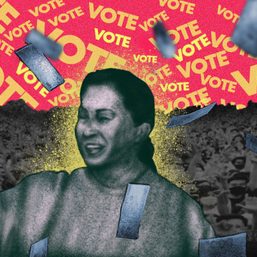


![[Newspoint] Improbable vote](https://www.rappler.com/tachyon/2023/03/Newspoint-improbable-vote-March-24-2023.jpg?resize=257%2C257&crop=339px%2C0px%2C720px%2C720px)
![[Newspoint] 19 million reasons](https://www.rappler.com/tachyon/2022/12/Newspoint-19-million-reasons-December-31-2022.jpg?resize=257%2C257&crop=181px%2C0px%2C900px%2C900px)
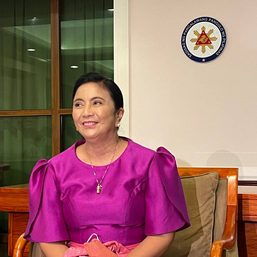


![[New School] Tama na kayo](https://www.rappler.com/tachyon/2024/02/new-school-tama-na-kayo-feb-6-2024.jpg?resize=257%2C257&crop=290px%2C0px%2C720px%2C720px)
![[Only IN Hollywood] After a thousand cuts, and so it begins for Ramona Diaz and Maria Ressa](https://www.rappler.com/tachyon/2024/02/Leni-18.jpg?resize=257%2C257&crop=262px%2C0px%2C720px%2C720px)



![[Dash of SAS] Making abortion a constitutional right](https://www.rappler.com/tachyon/2024/03/Its_true_-_Flickr_-_Josh_Parrish-1.jpg?resize=257%2C257&crop=125px%2C0px%2C768px%2C768px)
![[WATCH] Spoil me but respect me: A sugar baby’s story](https://www.rappler.com/tachyon/2024/03/titlecard-03.jpg?resize=257%2C257&crop_strategy=attention)

There are no comments yet. Add your comment to start the conversation.